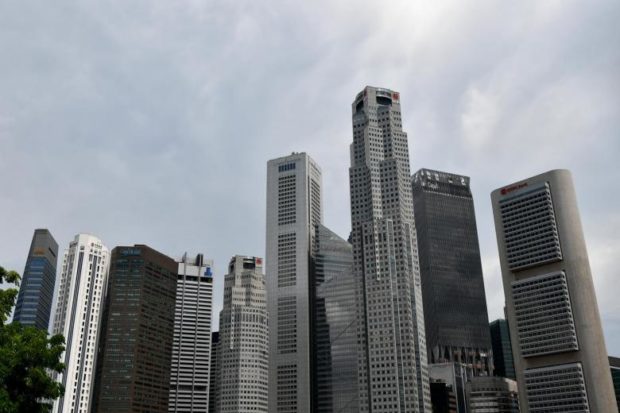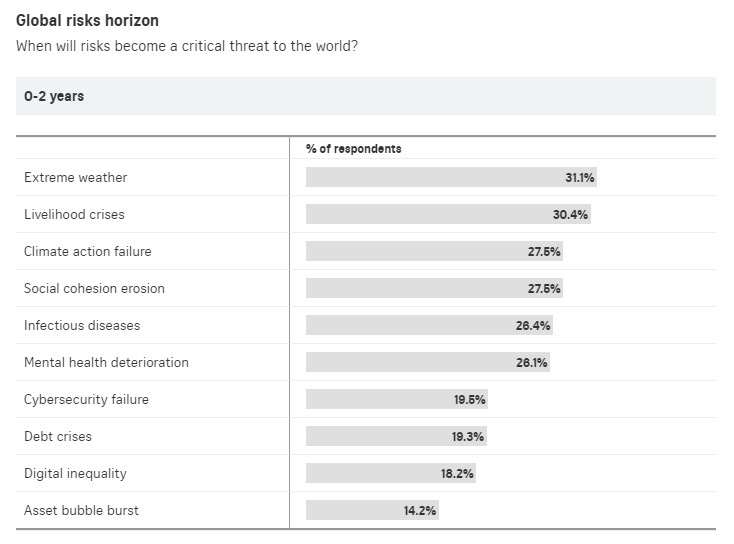Economic stagnation is No. 1 worry of Singapore businesses–WEF report

Globally, the WEF report found climate risks dominating the short and long-term global concerns. The Straits Times FILE PHOTO
SINGAPORE — The possibility of a prolonged economic stagnation setting in is the biggest worry over the next two years for Singapore businesses, a survey by the World Economic Forum (WEF) found.
Their other top five concerns: Infectious diseases, asset bubble bursts in large economies, failure of cyber-security measures and climate action failure.
These were the findings of WEF’s annual Global Risks Report for 2022, published in partnership with Marsh McLennan, SK Group and Zurich Insurance Group, and academic advisers including the National University of Singapore.
Business executives in the survey of 124 economies who ranked prolonged stagnation as their top concern included those from Argentina, Chile, Brazil, Finland, Japan, the Philippines, and South Africa.
Executive from Hong Kong, New Zealand, Switzerland and Turkey put the worry at second place, while Malaysia and Thailand placed it as the third biggest risk.
Among Singapore’s top trading partners, businesses in China ranked extreme weather events, asset bubble bursts, infectious diseases, collapse or lack of social security systems, and geopolitization of strategic resources as the top five concerns.
In the United States, the biggest worries were asset bubble bursts, climate action failure, extreme weather events, debt crises, and employment and livelihood crises.
The concerns in Singapore chimed with a separate WEF survey of analysts and government leaders that found that only one in six were optimistic while just one in 10 believe the global economic recovery will accelerate.
Most of these experts believe global economic recovery will be volatile and uneven over the next three years.
The report said economic fallout from the pandemic is compounding with labour market imbalances, protectionism, and widening digital, education and skills gaps that risk splitting the world into divergent trajectories.
In some countries, rapid vaccine roll-out, successful digital transformations and new growth opportunities could mean a return to pre-pandemic trends in the short term and the possibility of a more resilient outlook over a longer horizon.
Yet, many other countries will be held back by low rates of vaccination, continued acute stress on health systems, digital divides and stagnant job markets.
These divergences will complicate the international collaboration needed to address the worsening impacts of climate change, manage migration flows and combat dangerous cyber risks.
WEF managing director Saadia Zahidi said the report shows that economic and health disruptions are compounding social cleavages, creating tensions at a time when collaboration within societies and among the international community will be fundamental to ensure a more even and rapid global recovery.
“Global leaders must come together and adopt a coordinated multi-stakeholder approach to tackle unrelenting global challenges and build resilience ahead of the next crisis,” she said in a statement released with the report.
Globally, the WEF report found climate risks dominating the short and long-term global concerns as the world enters the third year of the pandemic.
Mr Peter Giger, group chief risk officer at Zurich Insurance Group, said the climate crisis remains the biggest long-term threat facing humanity.
“It is not too late for governments and businesses to act on the risks they face and to drive an innovative, determined and inclusive transition that protects economies and people,” he said.
The top shorter-term global concerns in the WEF report included heightened cyber risks, societal divides, livelihood crises and mental health deterioration.
Ms Carolina Klint, risk management leader for Continental Europe at Marsh, said: “With cyber threats now growing faster than our ability to eradicate them permanently, it is clear that neither resilience nor governance is possible without credible and sophisticated cyber risk management plans.
She noted that as companies recover from the pandemic, they are rightly sharpening their focus on organizational resilience and environmental, social and governance credentials.
RELATED STORY


